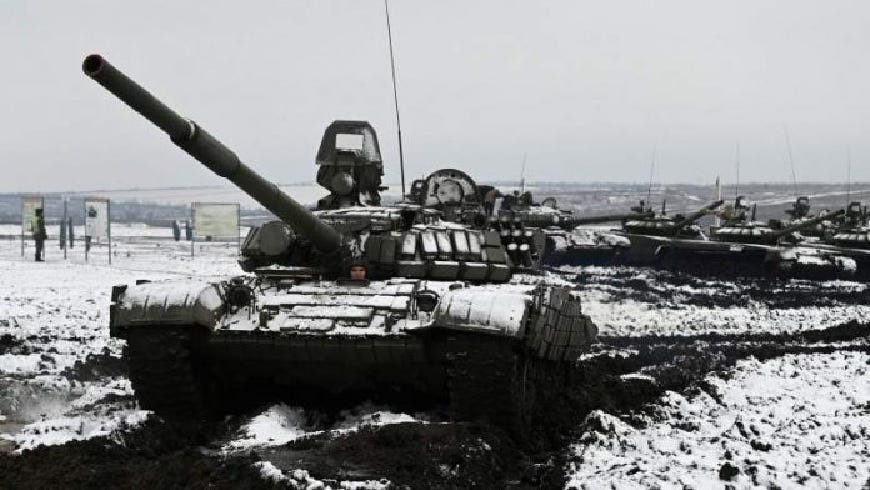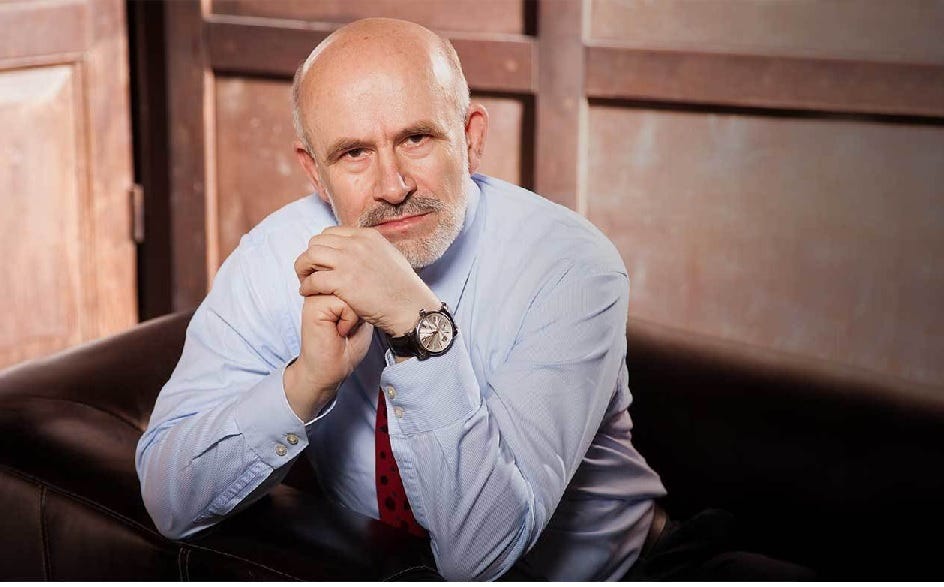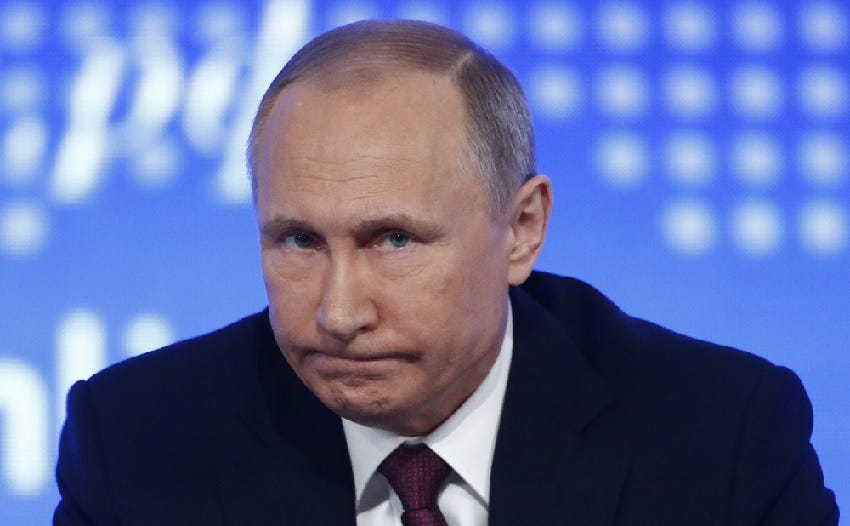As Russia and Ukraine creep closer to war, we ask where went the hope at the end of the Cold War?
Those patriotic Ukrainians who wish to remain Ukrainian are arming themselves against what now appears inevitable, and in short order.
Russia moved tanks, attack helicopters and artillery closer to the Ukrainian border over the weekend, even before the provinces of Donetsk and Luhansk announced declarations of independence from Ukraine Monday. (Photo: Russian Armed Forces Network) _______________________________________________________________________________________________________________
A three-way phone call early Monday among Russian President Vladimir Putin, French President Emmanuel Macron and German Chancellor Olaf Scholz revealed that Russia recognizes two provinces in Ukraine ― Donetsk and Luhansk ― as sovereign nations. this afternoon U.S. time, Putin began addressing the Russian people to officially do so.
The two provinces announced late Sunday they were declaring themselves independent of Ukraine, referring to their new states as “People’s Republics” much as the old Soviet bloc satellites once referred to their nations. Much of the population in Donetsk and Luhansk is ethnic Russian and Russian-speaking. Many older citizens of Ukraine living in those territories mourned being cut off from Russia when Ukraine declared its own independence in 1991.
By recognizing the provinces’ declarations, Putin likely intends to respond to requests from them ― certain to come as soon as Tuesday ― to send Russian troops across the border to support their independence against Ukrainian efforts to prevent the separation of the provinces from the Ukraine. Separatists in Donetsk and Luhansk have been fighting the Ukrainian military for weeks, though until Sunday there was no indication by the provincial governments to declare their independence.
In the speech that began about 1:30 p.m. EST, Putin claimed the two provinces are “ancient Russian land” as is, he stated, is all of Ukraine. He argued that modern Ukraine itself is the creation of “communist Russia,” as Putin referred to the Soviet Union.
He then recognized the independent of the two breakaway provinces about midway through the speech, but seemed, by his declarations regarding the rest of Ukraine, that he may not stop with defense of Donetsk and Luhansk
Ukraine has maintained throughout the crisis with Russia that it will fight to repel an invasion. The people themselves have armed themselves against the ever-increasing likelihood of an incursion into Ukraine’s sovereign land. With the tone of Putin’s speech, President Volodymyr Zelenskyy will undoubtedly be forced to put the military on highest alert. Putin could easily interpret that as provocation for invasion of the entire nation.
There only response to the the new development came late Monday afternoon when Biden announced sanctions against investment or the conducting of business in Donetsk or Luhansk, which most foreign policy experts rejected as meaningless.
Secretary of State Anthony Blinken said Friday that an invasion would be a “gross violation of international law” and that U.S. response would be “swift and severe.” However, as Biden has ruled out military involvement on the ground in the Ukraine, the statement lacked teeth and obviously did nothing to deter Putin from these actions.
Caught on the sidelines with absolutely no recourse are American consumers. Though financial markets were closed Monday for Presidents’ Day, futures in oil, gas and the market itself were down, and are expected to open Tuesday in a nose dive. That means ever more of an increase in inflation, higher gasoline, heating oil and natural gas prices as well as price increases for all petroleum-based consumer goods.
As Jesse Watters said on Fox News’ “The Five” Monday, “The American people are not ready for this.”
With Russia and Ukraine on the brink of war, it begs the question of what went wrong. The Cold War ended 30 years ago with such fanfare. Many people assumed the world would become a better place, at least in terms of geostrategic stability, and many diplomats have been deeply disappointed by the latest developments.
Former Soviet leader Mikhail Gorbachev's interpreter Pavel Palazhchenko is one of them.
Pavel Palazhchenko was the interpreter for the last Soviet Premier, Mikhail Gorbashev, has watched the development of imminent war between Russia and Ukraine that may threaten all of Europe. He finds fault with both Russian and Western leaders for failing to deescalate the situation. (Photo: Pavel Palaszhencho via APB Speakers Bureau/apbspeakers.com) _______________________________________________________________________________________________________________
He lived through the historic moments leading to the end of the Cold War, side by side with American and Soviet leaders, carefully relaying their messages. Palazhchenko said Sunday he hoped that all wouldn't be lost, and that its spirit and lessons could come to mind in this time of crisis. While he admitted much of the legacy left by former President Reagan and Gorbachev has eroded, something "is still with us," he said.
"We still have this experience of two nations that are very widely apart on many issues working together to address some of the challenges that the world is facing today," Palazhchenko continued. "Some of those challenges were present 30 or 40 years ago, but some are new and there will be new ones. Without Russia and the United States, and I would add China and Europe, working on those challenges anew, the world will be in an extremely difficult place," he noted.
Asked what working with Gorbachev was like, Palazhchenko said, "I enjoyed working for him even though it wasn't all roses," explaining how the process of getting to the end of the Cold War was, unsurprisingly, very difficult. "But I was very proud that we succeeded. I was very proud that in 1988, when President Reagan was in Moscow, standing near the Tsar Cannon and [someone] asked whether he still considered the Soviet Union an evil empire, he said no. It was another time, another era. That was one of the highlights.”
Palazhchenko's career also included work with President George H.W. Bush, who was the one actually in office when the Cold War officially ended. The interpreter said he particularly enjoyed watching the relationship between Reagan and Gorbachev evolve. When asked if he ever saw harsh rhetoric between the two sides on the level it's seen today, he said maybe not personally, but he heard Reagan talk tough to Gorbachev.
"I was present during that difficult beginning when Reagan started out a one-on-one talk calling out Marxism-Leninism, criticizing the Marxist-Leninist dogma, saying it sowed enmity and class struggle around the world and went on with that diatribe for several minutes," Palazhchenko said.
Still, he added that Gorbachev ultimately found his in. "He was happy that Reagan said we need arms reduction rather than arms control and they started talking in [Reykjavík, Iceland] about a world without nuclear weapons," Palazhchenko said. "It was very perceptive of Gorbachev to recognize Reagan's aversion to nuclear weapons. On many issues, they were poles apart, but Gorbachev came to believe that Reagan was for real in his rejection of nuclear weapons and Gorbachev said, ‘This is what we share. We can make it work.’"
He repeated, "Those were the highlights of my career, and I don't know if in my lifetime I will see a return to these goals and the two nations working toward these goals, but I would love to see it happen."
Palazhchenko, who has been keeping busy at the Gorbachev Center and has himself put out a recent paper on reducing military risks in Europe, said he believed there's a diplomatic solution to everything. He did assert that the state of relations between the West and Russia has come from mutual disappointment borne out of too many illusions both sides held about how life together and apart would be after the Cold War.
Both Obama and Biden have for too long ignored Russia’s concerns for its own security, Palazhchenko said. They have failed to understand the mindset or the psychology of Russia.
The psychology of the Russian people is reflected in their leaders. Putin is a product of the KGB, the Soviet spy agency that waged a brutal secret war against Western intelligence agencies. The KGB was founded by Josef Stalin, the Russian dictator who died in 1953, with the Russian people irrationally mourning in the streets, people collapsing in grief and being crushed by the massive crowds. (Photo: Ivan Yearing/Associated Press) _______________________________________________________________________________________________________________
"That does have an effect," he said. "We are all human beings. Russian leaders are human beings, and so when they, time and again, raised their fears of NATO enlargement and the process relentlessly continues, it does cause resentment."
Both President George W. Bush and President Donald Trump nixed the idea of Ukraine joining the European-U.S. alliance. Bush did not want to provoke Russian paranoia and Trump wanted to see Ukraine address corruption in its government before giving consideration to Ukraine joining NATO.
For all Russia’s sternly expressed concerns about NATO offering Ukraine membership, there's a strong chorus of voices calling NATO expansion a "red herring," an excuse for Putin to annex not only the eastern provinces but all of Ukraine, no matter the cost.
Palazhchenko said Gorbachev has been disturbed by how this was going. He said the former Soviet leader always felt that if Russia and Ukraine were separated, there would be trouble, but not necessarily of this kind.
"He always warned things could happen that could be very dangerous between Russia and Ukraine,” Palazhchenko said, “but he always did what he could in order to bring those two nations closer together rather than see a continuation of this rift that we now see widening. For him, emotionally, it is very tragic."
The true tragedy now if for all those families divided by this standoff. Families are divided by the border and by ideology. Brothers and sisters have loud arguments over whether the eastern provinces should become part of Russia or remain with Ukraine.
Those patriotic Ukrainians who wish to remain Ukrainian are arming themselves against what now appears inevitable, and in short order.
For example, Dmytro Dubas thought his war was over when Russia annexed Crimea in 2014. Now, with the U.S. warning of an all-out Russian invasion of Ukraine, the veteran volunteer fighter can't ignore it.
"Last week I was pretty disturbed;” he admitted to American’s Conservative Voice. “I even went to my psychologist for help."
For months, Ukraine's Western allies have been pointing to Russian troops massing on the border. That's prompted military analysts abroad to produce endless maps covered in arrows that confidently predict how Vladimir Putin's troops will advance on Kyiv. Ukrainians who are in the direct line of any such incursion were, until this weekend, have been far less convinced it would happen.
Now they are all but certain the invasion will happen within the next 48 hours.
In 2014, then working in sales, Dubas joined the flood of volunteer soldiers pouring east when heavy fighting against Russian-backed forces erupted in Crimea. There has been a formal ceasefire in place since 2015 but it breaks down regularly and the threat of a sudden escalation in the violence is always present.
Dubas had returned to civilian life when the ceasefire was declared, storing the reminders of his time in the trenches in an old ammunition box painted and re-fashioned as a coffee table in his living room.
Ukrainian civilians are training to help the military fight a soon-coming war with Russia. (Photo: Pytor Schenokova/Kyiv Post) _______________________________________________________________________________________________________________
Now he's calmed his nerves by preparing for the worst possible scenario. He keeps his car topped off with fuel, he has bought sufficient emergency food supplies and has signed up with the territorial defense force to brush-up his skills.
“If the fight comes, I will join it again,” Dubas said.
It's a few decades since the 64-year-old finished his mandatory military service so he wanted a refresher course.
"The enemy is at our border," he said. "Everyone should be prepared."
Kyiv city schools have been practicing air raid drills, social media is full of official guides to preparing an emergency "grab bag" for evacuation and people have begun plotting their escape route which mostly involves driving west as fast as they can.
Even pensioners have been joining weekend drills in woodland outside Kyiv where concrete factory ruins covered in graffiti stand-in for a battlefield. The men are too old to sign formal contracts, but military trainers don't turn them away.
At the privately-owned Priamyi TV channel, Russia's deployment of some 100,000 troops to its border with Ukraine has now become "topic number one." Presenter Tiaras Berezovets describes Russia's president as "unpredictable" and worries about Putin's "idée fixe" that Ukraine has never been a sovereign nation.
"Putin wants to stop a nation from making its own choice, like Soviet leaders did in Eastern Europe for decades," the journalist told America’s Conservative Voice.
His own biography captures some of the complexity of this conflict: his first language is Russian as he's originally from Crimea which Russia annexed illegally from Ukraine in the wake of mass protests in 2014 demanding closer ties with Europe.
But Berezovets said his roots don't make him pro-Moscow, or part of any supposed "Russian world."
"We made our choice in 2014 and it's clear: We don't want to be part of the Russian 'empire'," he said firmly. "Even if there's no chance of joining the EU or NATO, our intent is to remain part of Western civilization which means the rule of law, freedom of speech. These are things Ukrainians are ready to fight for."
Palazhchenko, Gorbachev’s former interpreter, said that he thought the "megaphone diplomacy" of the current moment should have been toned down long before now, and that some quieter work would have been more effective. But the United States, for its part, after Obama and his incompetent State Department ― led by Hillary Clinton ― were caught flat-footed by the Crimea invastion, has made a strategic decision to try to call Russia out on transgressions before they happen.
Unfortunately, that strategy appears to have caused Russia to dig in deeper on Ukraine’s borders. The estimated 150,000 Russian soldiers menacing Ukraine appeared Saturday to be preparing for battle and many ordinary people from Kyiv to Kharkiv to Moscow are preparing even more frantically for war, to defend their country.
Palazhchenko said the Cold War ended in part because it may have been almost predestined, or because it ran its own course, but much of its conclusion was personality-driven.
"We needed world leaders today to step up to their responsibilities," he said. "But it appears it is too late now, even for that.”
Mike Nichols is an advocate of the counterrevolution with a four-step plan to defeat Leftist Fascism: We Organize. We Stand. We Resist. We Fight. He is a regular contributor to several conservative news websites and has a regular blog and Facebook presence at Americas Conservative Voice-Facebook.








